A double appointment on the calendar at the Teatro SanbàPolis in Trento with the contemporary regional season created by the Centro Servizi Culturali S. Chiara in Trento and the Teatro Stabile in Bolzano.
After hosting the Compagnia Abbondanza/Bertoni last week, on Thursday 30 and Friday 31 January the Teatro SanbàPolis will host Babilonia Teatri. The company founded by Enrico Castellani and Valeria Raimondi will be on stage with a double show: made in Italy (30 January) and Foresto (31 January).
Winner of the 2007 Scenario Award and the 2010 Vertigine Award, Made in Italy does not tell a story. It addresses in an ironic, caustic and desecrating way the contradictions of our time. The show proceeds by accumulation. It photographs, condenses and engulfs what surrounds us: the continuous messages that reach us, the need to catalogue, arrange, order everything. It proceeds by approaches, intersections, shifts of direction. Scenes don't start and they don't end. They are continually interrupted, bitten. Images and words are born and die all the time. Actors don't act. Music is always present and dictates the logic with which things happen.
"Since the title "made in Italy", the work of the Babilonia Teatri group shows a deep awareness of the theatrical dimension. – reads the motivation of the international jury of the Vertigine Prize, chaired by Nicole Petit (KVS – Royal Flemish Theatre, Brussels) - An artist is necessarily part of society: "made in Italy" represents both a self-analysis of its being an Italian theater group, and a way of reflecting important themes of our time. Babylon Theatres faces them with the specific tools of the theatre. This production does not provide didactic answers to crucial questions of a social order, rather it offers a rethinking of the theatre itself. The way in which language is used, the text recited, the body moved on the scene and the use of space, sound and light, are indicators of contemporary maturity and a unique approach, appreciated by the international jury ".
The show Foresto, on the other hand, is based on Bernard-Marie Koltès' "The Night Just Before the Forests", and features a meeting of languages. Between French, Italian and dialect. Between written and oral language. Between LIS and electronic music.
An actor, a LIS performer and a musician create a hybrid creation where differences coexist. The differences cross Koltès's writing and inhabit the scene. A cultural challenge to forge a theatre where differences explode to strengthen each other.
"The night just before the forests is a sort of secular sacred text," the company writes in the director's notes. It is enveloped by an aura that precedes it and evokes its uniqueness and power. For us, it is a totem that we approach with enthusiasm and fear. Two different feelings are intertwined in us: the awe and the desire to immerse ourselves in Koltès's writing, to roll in it, to give life to a melee with words to whisper and shout them together.
"Foresto", in the Veronese dialect, means foreigner, derives from the Latin foris, which means "who comes from outside, from elsewhere". This term is a bridge between Koltès and us: between the forests of Koltès's title, the foreigners who inhabit his text and our translation.
Foresto guided us in translating, he offered us a key to deal with the text, to translate terms and meanings related to the France of the 1970s and the immigration of those years into our own today, betraying Koltès so as not to betray him. - the company continues - We would not have had the ardor to put Koltès' words in our mouths without first having chewed them, digested them and spit them out through our mother tongue: a dirty language, halfway between slang and dialect: the language of the belly, of instinct, of mood, of love, of truth, of the unmediated. The hardness and poetry of the mother tongue allow us to adhere to Koltès: to dirty the words, to assign a rhythm and a sound that belong to us, that of the road, of love.
Two voices for a monologue: one spoken and one marked. Two voices that oppose each other, meet and multiply: that they become one voice, that they become unison, that they become world. Two voices in dialogue with a third voice: the voice of electronic music played live on stage. A game of mirrors in which different languages intertwine and dialogue with each other ".
